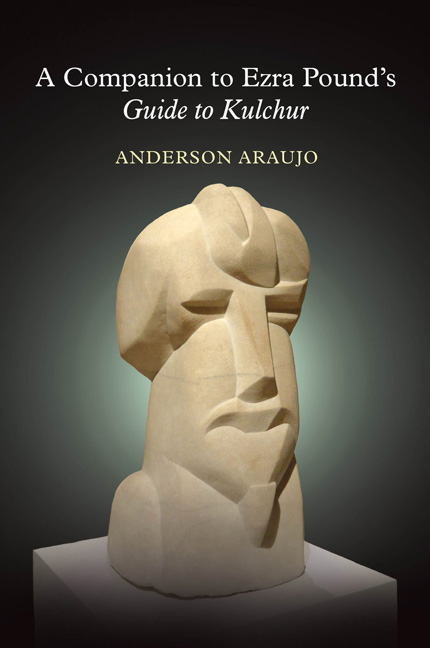Book contents
- Frontmatter
- Contents
- Acknowledgments
- Abbreviations
- Introduction
- Guide to Kulchur
- Part I
- Section I
- Section II
- Part II
- Section III
- Section IV
- Part III
- Section V
- Section VI
- Part IV
- Section VII
- Section VIII
- 29 Guide To Kulchur
- 30 The Proof Of The Pudding
- 31 Canti
- 32 The Novel And So Forth
- 33 Precedents
- 34 On Arriving And Not Arriving
- 35 Praise Song Of The Buck-Hare
- 36 Time-Lag
- 37 The Culture Of An Age
- Section IV
- Part V
- Section X
- Section XI
- Part VI
- Section XII
- Section XIII
- Addenda: 1952
- Notes
- Index
31 - Canti
from Section VIII
- Frontmatter
- Contents
- Acknowledgments
- Abbreviations
- Introduction
- Guide to Kulchur
- Part I
- Section I
- Section II
- Part II
- Section III
- Section IV
- Part III
- Section V
- Section VI
- Part IV
- Section VII
- Section VIII
- 29 Guide To Kulchur
- 30 The Proof Of The Pudding
- 31 Canti
- 32 The Novel And So Forth
- 33 Precedents
- 34 On Arriving And Not Arriving
- 35 Praise Song Of The Buck-Hare
- 36 Time-Lag
- 37 The Culture Of An Age
- Section IV
- Part V
- Section X
- Section XI
- Part VI
- Section XII
- Section XIII
- Addenda: 1952
- Notes
- Index
Summary
There is no mystery about the Cantos, they are the tale of the tribe: The source for Pound's oft-quoted label for The Cantos is an address Kipling delivered at the Royal Academy Dinner in 1906. He also employs the phrase in a letter of April 1937 to John Lackay Brown, signaling the importance of pulling off his great poetic experiment “as reading matter, singing matter, shouting matter, the tale of the tribe.” In composing The Cantos Pound hoped to embody Kipling's conception of the artist's task of articulating at a fundamental level, as Michael Andre Bernstein puts it, “the common aspirations, ethical beliefs and unifying myths” of his era.
Malatesta cantos: Cantos 8–11.
Monte dei Paschi: Founded in 1472, the Banca Monte dei Paschi is the oldest bank in the world and presently heads the Gruppo Montepaschi, the third largest Italian banking group. The bank's revenue came directly from the grazing rights to the paschi, or pastures, near Siena, and from the agricultural production of the land. Hence, as a financial index of “the abundance of nature,” as Pound states here, the Monte is the antithesis of usury's animus contra naturam, “against nature” (cf. notes GK 15, 281). The Monte is the chief concern of Cantos 42 and 43, with the earlier Canto underscoring the Sienese bank's mission to lend and “receive licitly money / at moderate and legitimate interest” (42/210). Narciso Mengozzi, Pound's primary source for the history of the Monte dei Paschi, lays further emphasis on the bank's aim “to improve the moral and material welfare of the working classes” (al miglioramento morale e al benessere material delle classi lavoratrici).
“stinking puritan”: American Creoles and Southerners often directed this pejorative phrase at their Northern foes, particularly in the post-Civil War period.
Comstockery: “Excessive opposition to, or censorship of, supposed immorality in art or literature; prudery.”
- Type
- Chapter
- Information
- A Companion to Ezra Pound's Guide to KulcherGuide to Kulcher, pp. 229 - 231Publisher: Liverpool University PressPrint publication year: 2018



